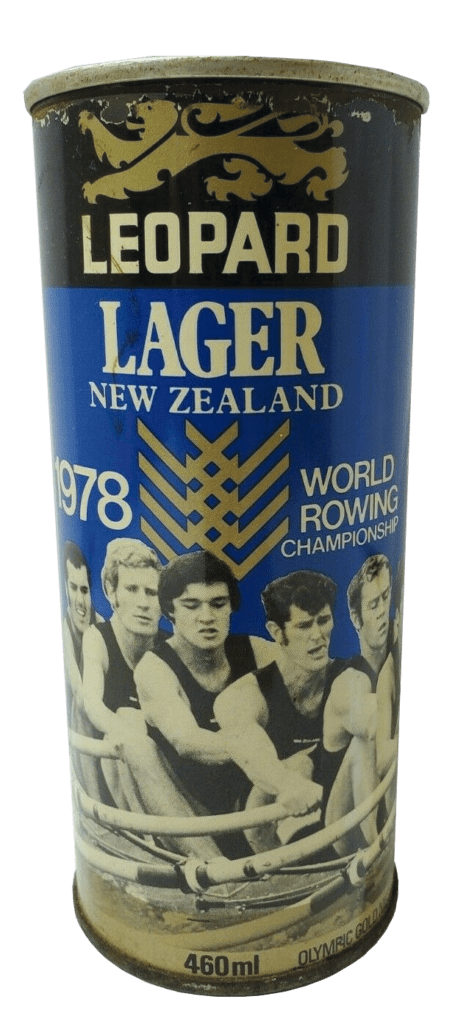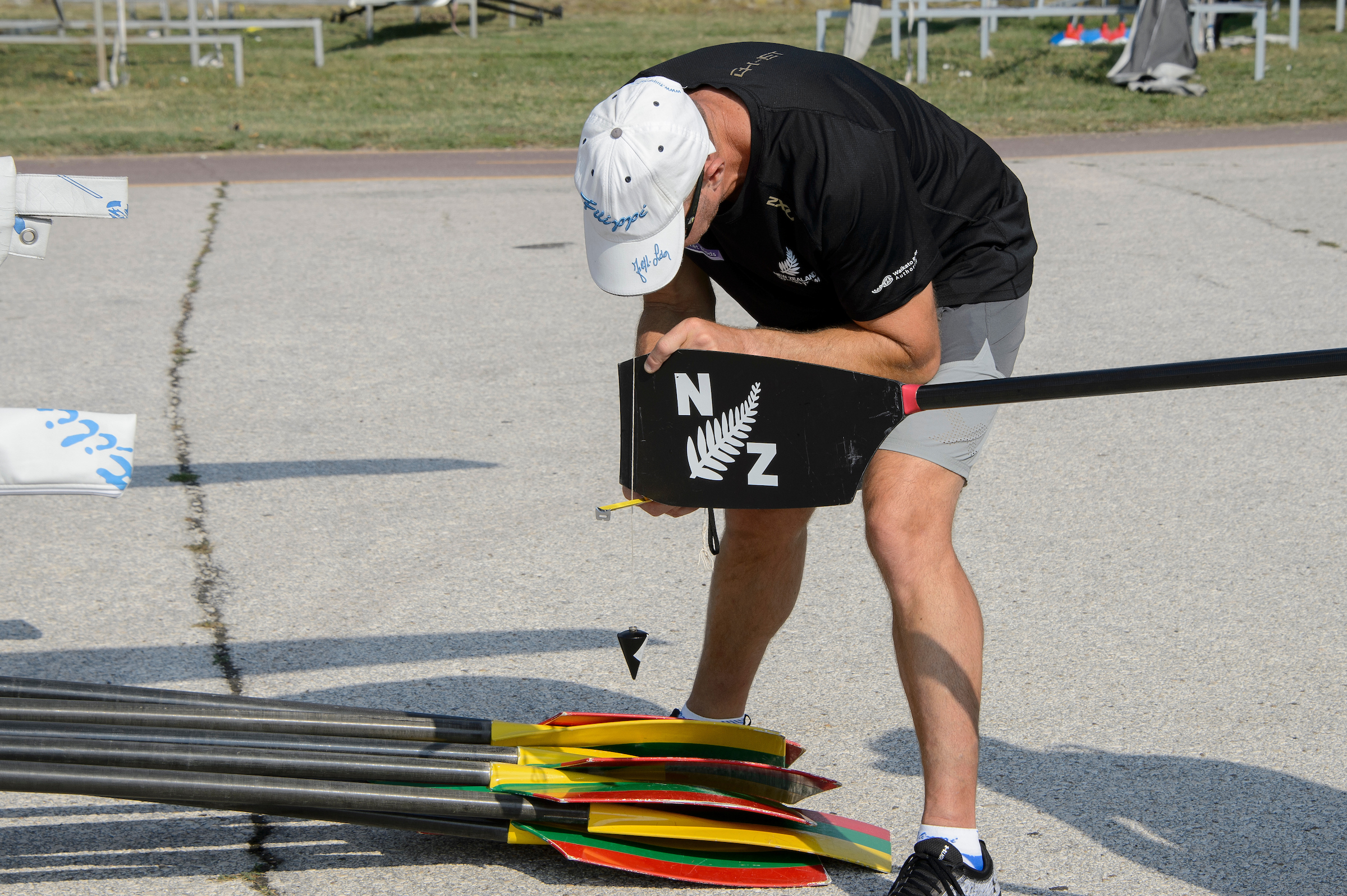BY ANDY ANDERSON
PHOTO BY KARON PHILLIPS
To continue reading…
This article is exclusively for Rowing News subscribers. For as little as $5 a month, you can get access to the best quality, independent reporting on all the issues that matter to the North American rowing community.
Already a subscriber? Login
When my housemate Tiff Wood returned from the world championships at Lake Karapiro in New Zealand in 1978, he brought with him a Leopard Lager beer can that featured a photo of the 1972 New Zealand men’s eight that had won Olympic gold in Munich. We all know that New Zealand is the country with the tiny population that punches way, way above its weight in rowing. But to be featured on a beer can? These guys must have been revered as gods in their country. And once again in the recently completed Olympics, the Kiwis produced fantastic results, winning three gold and two silver medals.

“We came home, made some changes in the boat, brought in a few younger guys, and made us look at ourselves and push harder. It seemed like every time we had a setback, including the heat at the Olympics, it turned out to be a bonus because we gained from it.”
–Tony O’Connor
The New Zealand men’s eight was the first eight to win gold, having come out of the qualifying regatta at Lucerne. They had been sixth at the 2019 Worlds, but only the top five boats were assured of Olympic participation. When the 2020 games were postponed, that meant the team had to train for another year just to see if they could qualify.
Coach Tony O’Connor says that when they did not qualify in 2019 it was a blessing in disguise. “We came home, made some changes in the boat, brought in a few younger guys, and made us look at ourselves and push harder. It seemed like every time we had a setback, including the heat at the Olympics, it turned out to be a bonus because we gained from it.”
New Zealand has had great success over the past decade. Leading the pack were Hamish Bond and Eric Murray. They ruled the coxless pair from 2009 until 2016, going undefeated for eight years and 69 races and winning Olympic gold in 2012 and 2016. When Murray retired after Rio, Bond took time off and pursued his other passion, road cycling. But by 2020 he was looking forward to getting back in a boat. He let his teammates on the Kiwi squad know that he wasn’t interested in a third gold in the pair. If he was coming back to row, he wanted to row in the eight.
Meanwhile, Michael Brake and Tom Murray (no relation to Eric) had won a silver medal in the pair at the 2019 Worlds. They had a tough decision. They had qualified the pair for the Olympics and looked to have a good shot at a medal. But their path became clear in the long months of training after the 2019 regatta. “I’ve always wanted to win Olympic gold,” Brake said. “With Hamish coming onto the squad for the eight, it seemed like we could have a shot at it.”
O’Connor recalls a key moment in April 2021. “We did a lot of rowing in pairs, and one day we had four pairs out for an 11K training row. I said, ‘We won’t push too hard,’ but Bond and Tom Murray took off. Shaun [Kirkham, eventual seven man of the eight] and [Phillip] Wilson [six] stayed right with them, and the other two pairs held right on, too. We got on shore and Hamish said, ‘We’ve got four world-class pairs here.’ When your hero says you are as good as he is, well, that’s pretty good motivation. That was a turning point. We didn’t have a fast eight yet, but we knew that we could.”
They tried all kinds of combinations, beginning with Bond at stroke, then at six, and eventually at two. “His rhythm at stroke just wasn’t working for the eight, so we kept looking for what worked,” O’Connor said. His crews praise the coach for being a calming presence, letting the guys work out a lot of things by themselves over a couple of months of training and bringing the younger guys along. When they got to Lucerne for the qualification regatta on May 16, 2021, the eight was moving well. They won that race and punched their ticket to Tokyo. Hours later, they were on a 30-hour flight back to New Zealand, where they would have to quarantine for two weeks.
“It wasn’t ideal,” said coxswain Sam Bosworth, “but for two weeks, all the guys had single hotel rooms with ergos. Their lives were erg, eat, sleep, and watch TV.”
When the two weeks were up, O’Connor says they were itching to get back on the water, so much so that they went out in the cold and the dark—remember, it is their winter in June. With only five weeks to train for the Olympics, they made every workout count. When I asked if there had been any special moments, they all talked about a barbecue they had with Sean Colgan.
Colgan, a frequent correspondent with Dr. Rowing, was bow seat for the U.S. Olympic eight in 1980. Unable to compete because of the boycott of the Moscow Games, he has kept a burning passion for rowing. When he and his wife, Bibi, moved to New Zealand in 2015 to run a sheep farm, he got to know the rowing scene and made a commitment to supporting the men’s eight financially for five years. “I presume you mean to support the women’s eight, also,” Bibi said. He concurred.
He was present for just the right amount of time, according to O’Connor. “Besides the monetary support, he got to know the guys, and it was a great relationship.” Before departing for Japan, he brought down 50 kilos of venison and pheasant to grill and talked with them about the
races. “This isn’t about what you need,” he told them. “It’s what you want. Your future life
will not be defined by an Olympic medal. It will be awesome to be at the Olympics,
regardless of the result. Enjoy yourselves. But think about what you want.”
Michael Brake and Sam Bosworth both say that Sean’s advice relieved a certain kind of pressure. But in their heat, they were too excited and finished second behind the Netherlands.“We all knew where we went wrong,” Bosworth said. “We were too high, mostly 40. So in the rep, we focused on rowing longer and a beat lower, taking our ‘big-boy strokes’.”
Winning the rep gave them the confidence they needed to row a great final. “For the final, I was watching the video, and just before the start, it looked like Murray was laughing, and Shaun was so relaxed he looked bored,” O’Connor said.
“I had the good kind of nervous—excited,” explained Brake. An old friend had told me that when you get to the thousand, smile and realize that this is fun. I swear that when Sam called the thousand, I couldn’t help but smile. We were moving on the Germans, and after that, we were coming through. At 750 to go, Hamish yelled, “We’re in front. Go for gold!” When a guy like Hamish says that, you feel electricity.”
Watch the video and tell me if you don’t see a boat relaxed, confident, and awesome. Gold medalists! When they come out of lockdown a couple of days after I write this, will they be hoisting Leopard Lagers with the 2021 eight on the can? I certainly hope so.

